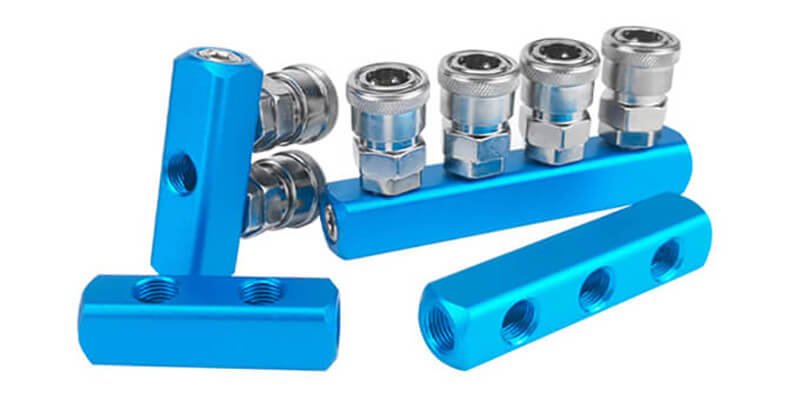In the world of pneumatic systems, efficiency and precision are crucial. One component that plays a key role in ensuring both is the aluminum manifold block. A manifold block helps streamline the connections between different parts of a pneumatic system, such as valves and cylinders, by consolidating multiple connections into a single, compact unit.
Aluminum manifold blocks are designed to reduce piping complexity and improve airflow control, making them an essential part of many industrial applications. In this article, we will explore what an aluminum manifold block is, why aluminum is the material of choice, and its importance in modern pneumatic systems.
What is a Manifold Block?
A manifold block is a central component in pneumatic systems, designed to distribute air to different parts of the system. Essentially, it is a connector hub that allows several pneumatic components, such as cylinders, actuators, and valves, to be connected through one central unit. This helps streamline the system and reduce the amount of piping required.
Manifold blocks come in various sizes and configurations, with multiple ports for connecting air lines. They can control the direction of air flow, the pressure, and even help with exhaust functions in the system. In short, the manifold block acts as a control point for managing how air flows between different parts of the pneumatic system.
Key Functions of a Manifold Block:
- Air distribution: Directs compressed air to various parts of the system.
- Pressure regulation: Helps maintain the correct pressure levels for system components.
- Simplified installation: Reduces the number of pipes and fittings needed, saving time and resources.
By consolidating multiple connections into one unit, manifold blocks help make installation and maintenance simpler and more efficient.
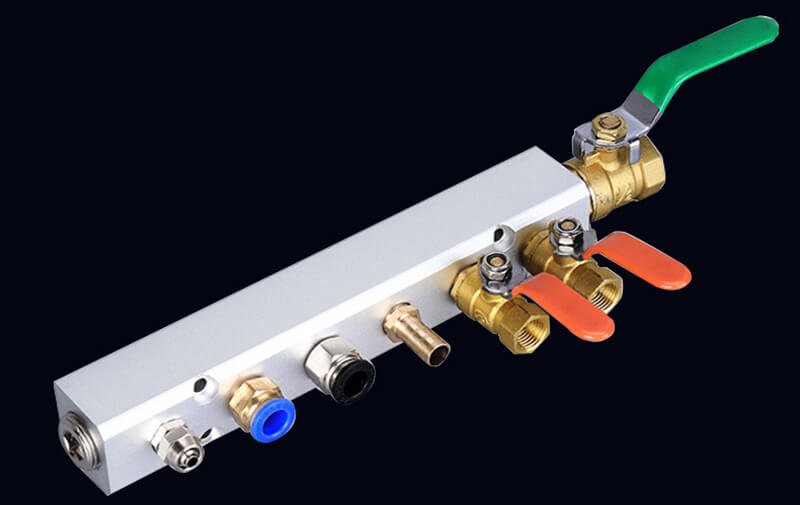
Why Aluminum?
The choice of material for manifold blocks is crucial because it affects the performance, durability, and cost of the entire pneumatic system. Aluminum has become the preferred material for many manifold blocks due to its unique properties.
Lightweight and Strong
One of the primary benefits of using aluminum is its lightweight nature, which makes it easier to handle and install. Despite being lightweight, aluminum retains a high level of strength, ensuring the manifold block can withstand the demands of high-pressure systems.
Corrosion Resistance
Aluminum has excellent corrosion resistance, making it ideal for use in environments where moisture or corrosive substances are present. This ensures a longer lifespan for the manifold block, even in harsh conditions.
Cost-Effective and Durable
Aluminum is often more cost-effective than other metals, such as stainless steel, while still providing a high level of durability. It is an economical choice for manufacturers who want to maintain high performance without breaking the budget.
Excellent Machinability
Aluminum is easy to machine and customize, which allows for complex designs and configurations. This flexibility makes it suitable for producing manifold blocks that fit specific system requirements.
Key Features of Aluminum Manifold Blocks
Aluminum manifold blocks come with several important features that make them essential for efficient pneumatic systems. These features not only enhance the performance of the system but also ensure ease of use and longevity. Let’s look at the key features of aluminum manifold blocks.
1. Multiple Ports and Configurations
Aluminum manifold blocks are designed with multiple ports that allow for seamless connections to various pneumatic components. These ports can be customized to fit different types of threading and configurations, such as NPT (National Pipe Thread) or BSP (British Standard Pipe). This flexibility ensures compatibility with various systems.
2. Modular Design
Many aluminum manifold blocks are modular, which means they can be easily expanded or customized based on specific needs. You can add more ports or features without replacing the entire block, making it a cost-effective solution for evolving systems.
3. Pressure and Temperature Ratings
Aluminum manifold blocks are built to handle a wide range of pressures and temperatures, making them suitable for both standard and high-performance applications. It’s important to check the pressure and temperature ratings to ensure the manifold block meets the requirements of your system.
4. Compact and Lightweight
One of the standout features of aluminum manifold blocks is their compactness. These blocks are often smaller than traditional piping systems, which helps save space and reduces the overall weight of the pneumatic system. This makes installation quicker and more efficient.
5. Durability and Resistance
Thanks to the inherent corrosion resistance of aluminum, these manifold blocks are built to last. They can handle exposure to harsh environments, including moisture and chemicals, without deteriorating, ensuring long-term reliability.
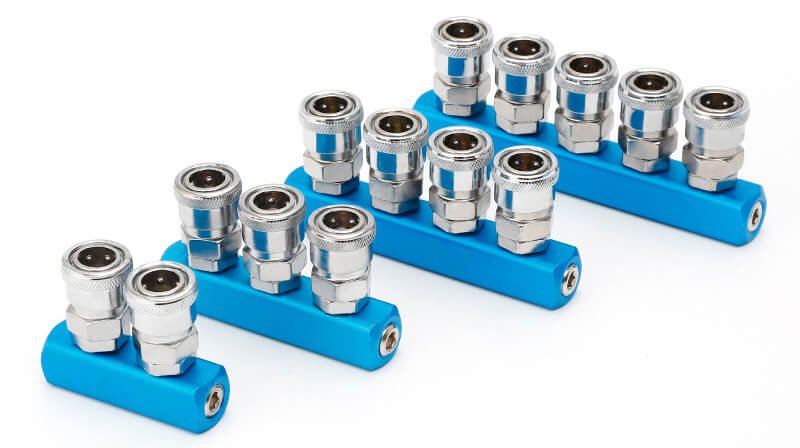
Applications of Aluminum Manifold Blocks
Aluminum manifold blocks are used in a wide range of industries and applications. Their versatility, durability, and cost-effectiveness make them an ideal choice for controlling air flow and simplifying pneumatic systems. Below are some common applications of aluminum manifold blocks.
1. Automotive Industry
In the automotive industry, aluminum manifold blocks are often used to manage compressed air for various machinery, such as robotic arms, pneumatic tools, and assembly line equipment. Their lightweight design helps improve efficiency in automation processes while reducing installation complexity.
2. Industrial Automation
In industrial automation systems, manifold blocks are used to distribute air to actuators, sensors, and valves. Their modular nature makes it easy to adapt them to changing needs in production lines or automated machinery.
3. Food and Beverage Processing
Aluminum manifold blocks play a crucial role in the food and beverage industry, where they are used for packaging, bottling, and food handling systems. The material’s resistance to corrosion makes it ideal for environments that may involve moisture, cleaning agents, and other potential contaminants.
4. Packaging
In packaging machinery, aluminum manifold blocks are often used to control air flow to packaging equipment such as sealers, conveyors, and fillers. Their small size and reliable performance help optimize packaging processes and reduce downtime.
5. Robotics
In robotic applications, manifold blocks are used to control the flow of air to the actuators, helping robots perform precise movements. Their compactness and ability to handle high pressures make them perfect for small, high-performance robotic systems.
6. Medical Equipment
In medical devices, such as ventilators or automated testing equipment, aluminum manifold blocks are used to control and regulate airflow. Their corrosion resistance ensures the equipment remains reliable and safe for use in healthcare environments.
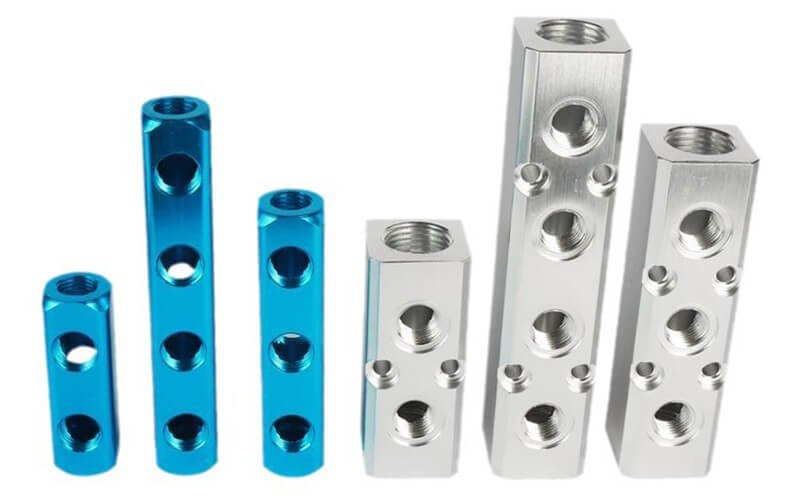
How to Choose the Right Aluminum Manifold Block
Choosing the right aluminum manifold block is crucial for ensuring the efficiency and performance of your pneumatic system. Here are some important factors to consider when selecting the best manifold block for your needs.
1. System Pressure and Flow Requirements
First and foremost, you need to check the pressure and flow rate requirements of your system. The manifold block should be rated to handle the specific pressure your system will operate under. If your system requires high pressure, ensure the manifold block is designed for such conditions.
2. Port Size and Configuration
Manifold blocks come in a variety of port sizes, which need to match the components you are connecting to. Port size determines the flow of air and should be compatible with the tubes or hoses in your system. Additionally, check the configuration of the ports to make sure it fits the design of your system.
3. Material Compatibility
While aluminum is a popular choice, ensure it’s the most suitable material for your application. Consider factors such as the presence of moisture or chemicals in the environment. Aluminum’s corrosion resistance is a key advantage, but in highly corrosive environments, you may want to confirm if aluminum is the best option.
4. Modular Design and Flexibility
If your system requires future expansions or changes, look for a modular manifold block. A modular design allows you to add or remove ports as your system evolves, providing flexibility in your setup.
5. Temperature Range
Check the temperature ratings of the manifold block. Aluminum blocks are generally capable of handling a wide temperature range, but ensure the block you choose can withstand the temperatures of your specific application.
6. Mounting and Installation
Consider how the manifold block will be mounted. Look for blocks that offer easy installation options, such as multiple mounting points or adjustable fittings, to simplify the setup.
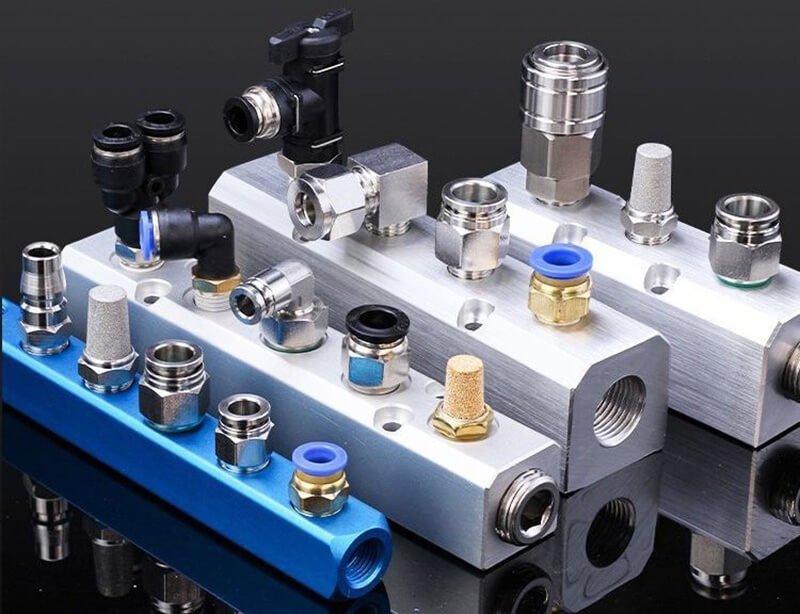
Benefits of Using Aluminum Manifold Blocks
Aluminum manifold blocks offer a wide range of benefits that make them an ideal choice for many pneumatic systems. Here are the top advantages of using these blocks.
1. Cost-Effective
Aluminum is often more affordable compared to other materials, such as stainless steel, while still offering excellent performance. This makes aluminum manifold blocks a cost-effective solution for both small and large pneumatic systems.
2. Lightweight and Easy to Handle
Due to aluminum’s lightweight nature, manifold blocks are easier to handle and install. Their smaller size also means they take up less space, which is especially useful in compact or constrained spaces.
3. Corrosion Resistance
One of the key benefits of using aluminum is its corrosion resistance. It is ideal for applications where exposure to moisture, chemicals, or harsh environments is common. This long-lasting durability ensures fewer replacements and lower maintenance costs.
4. Improved System Efficiency
Aluminum manifold blocks help streamline the design of pneumatic systems by reducing the number of connections and fittings. This leads to improved airflow, fewer potential leak points, and overall better system efficiency.
5. Customization and Flexibility
Many aluminum manifold blocks are modular and customizable, allowing you to adjust or expand your system as needed. This flexibility can be particularly beneficial in applications where system configurations change over time.
6. Maintenance and Durability
Aluminum manifold blocks are designed for easy maintenance. Their durable nature means they can withstand tough working conditions and continue to function effectively over time, minimizing the need for frequent repairs.
Conclusion
Aluminum manifold blocks are an essential component in modern pneumatic systems. Their lightweight, corrosion-resistant, and cost-effective nature makes them an excellent choice for a variety of industrial applications. By selecting the right manifold block based on your system’s requirements, you can improve efficiency, reduce installation complexity, and ensure long-lasting performance.
Whether you’re in automotive, industrial automation, or food processing, the modular and durable features of aluminum manifold blocks make them an invaluable tool for optimizing your pneumatic system. With proper selection and maintenance, these manifold blocks can provide reliable air flow control and cost savings for many years to come.

